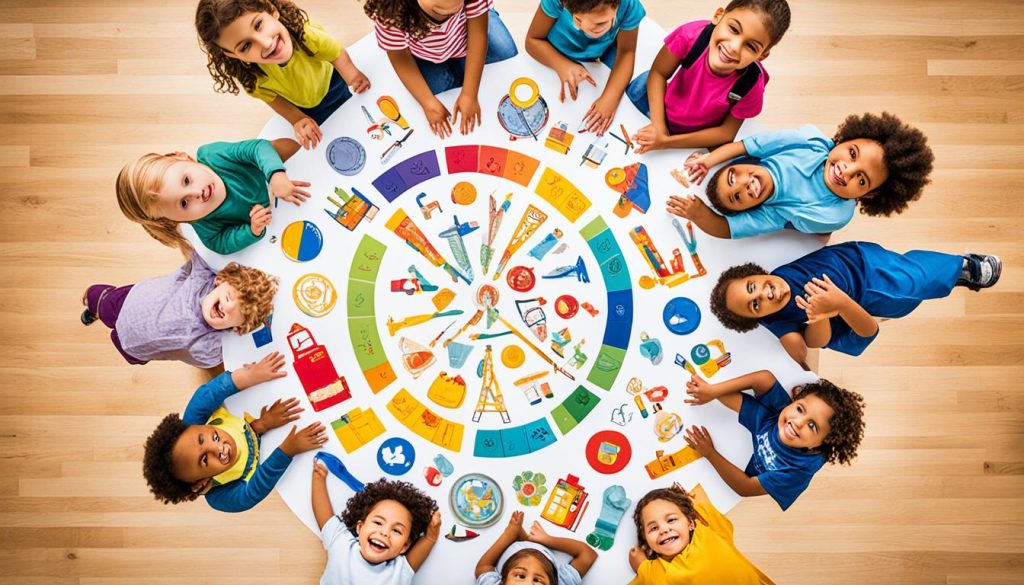Have you ever thought about the legacy you’re building in your family? In today’s fast world, making a family with strong family values is key. These values should be based on respect and empathy. This is vital for nurturing individual and collective well-being.
I remember sitting at the dinner table as a child. It was there that listening and understanding made us feel like we belonged. These moments of connection are crucial for building a caring, peaceful home.
A 2019 study found that 87% of people believe treating kids with respect helps them cooperate better and communicate positively. Another study by Focus on the Family showed that empathy and understanding improve emotional smarts in kids. These findings highlight how instilling respect and empathy in parenting is vital. It’s a key step towards fostering family harmony.
Key Takeaways
- Treating children with respect leads to increased cooperation and positive communication (87%)
- Practicing respectful parenting techniques connects parents to their children (63%)
- Respectful parenting leads to a substantial decrease in behavioral issues (45%)
- High levels of emotional intelligence observed in children raised with empathy (78%)
- Strong family values create a robust framework for coping with challenges
The Importance of Family Values
Family values are the beliefs and ethics shared by a family. They guide daily life, discipline, and educational goals. By setting core values, families give children guiding principles for life.
Defining Family Values
Family values include empathy, honesty, loyalty, respect, and perseverance. These values show up in how families act and make decisions. Parents are key by showing these values, talking about them, and making them part of daily life.
It’s good to pick 5-10 core family values to shape your family’s culture.
Impact of Family Values on Relationships
When families share the same beliefs, they build stronger bonds. For example, respect helps everyone get along better. Integrity builds trust and confidence.
Family values shape behavior, making families more structured. They make sure everyone feels important and understood. Seeing the value of sleep for kids is also a family value, affecting their health.

Examples of Positive Family Values
Some good family values are:
- Kindness: Encourages being generous, empathetic, and fair.
- Self-compassion: Teaches kids to be kind to themselves.
- Integrity: Makes sure actions match promises.
- Responsibility: Makes kids feel important and helps with positive relationships.
- Honesty: Builds trust and helps in all areas of life.
- Flexibility: Helps with adapting to surprises.
- Fairness: Teaches the value of equality and fair treatment.
These values can be part of everyday life, creating a strong family bond. By setting and sticking to family values, your family’s choices and actions will reflect what’s best for your kids.
| Core Values | Attributes |
|---|---|
| Kindness | Generosity, Empathy, Compassion, Equity |
| Integrity | Trust, Confidence |
| Respect | Harmonious Interactions |
| Responsibility | Value, Positive Relationships |
| Flexibility | Adaptation to Changes |
| Fairness | Equality, Just Interactions |
Role of Empathy in Family Dynamics
Empathy is key to a happy family life. It lets us understand and feel what others are going through. This helps families connect deeply and build respect and inclusivity. It also helps kids grow emotionally and socially.
Understanding Empathy
Empathy has both thinking and feeling parts. It lets us feel others’ feelings. In families, how parents feel affects their kids’ social skills. Being warm and understanding helps kids be more empathetic.
But, if parents struggle with their feelings, it can be harder for kids. So, empathy is important for strong family ties and good emotional health.
Benefits of Practicing Empathy
Empathy makes families stronger. It helps kids manage their feelings better. This can stop problems like acting out or feeling too much.
It also makes kids more likely to help others. Studies show kids with empathetic parents behave better and make friends easier. Teaching empathy can stop bad behavior and help kids understand others’ views.

Teaching Empathy to Children
Teaching kids to be grateful helps them be more empathetic. Parents are key in teaching empathy by showing kindness and talking about feelings. Things like emotion coaching and empathy lessons at school help too.
When parents and teachers work together, kids learn empathy better. This approach not only helps kids but also makes our society kinder and more welcoming.
Strategies for Positive Parenting
Positive parenting focuses on building strong family bonds. It uses methods like active listening and modeling good behavior. These help your child grow emotionally and manage screen time well.

Active Listening in Parent-Child Communication
Active listening is key in positive parenting. It means being fully there, understanding, and taking part in talks with your child. This builds trust and strengthens your bond. It also helps manage screen time by setting aside time for real talks.
About 89.6% of adults will become parents at some point. So, using good communication early on is crucial. Studies show that positive parenting boosts emotional health and school success. This proves how important active listening is.
Modeling Respectful Behavior
Children copy what parents do, so showing respect is important for their social skills. By being respectful every day, your child will follow your example. The Gottman Institute’s ’emotion coaching’ program shows how this helps kids understand and manage their feelings.
Positive reinforcement is key to good behavior. It works better than scolding. A seven-year study found that supportive parenting leads to better school performance and fewer problems.
By being respectful, you help your child develop social skills. Positive interactions and spending quality time together strengthen your bond. This also reduces behavior issues.
| Positive Parenting Strategy | Key Benefits | Implementation Tips |
|---|---|---|
| Active Listening | Builds Trust, Enhances Communication, Fosters Emotional Intelligence | Make eye contact, avoid interruptions, provide empathetic responses |
| Modeling Respectful Behavior | Promotes Social Skills, Encourages Mimicking of Positive Actions | Demonstrate respect in interactions, clear and respectful communication |
| Managing Screen Time | Improves Quality Interactions, Strengthens Relationships | Set screen time limits, prioritize family activities |
| Positive Reinforcement | Encourages Good Behavior, Enhances Self-esteem | Use praise and rewards, consistent feedback |
| Fostering Emotional Intelligence | Improves Self-regulation, Builds Empathy | Emotion coaching, validate feelings, teach coping skills |
Setting Boundaries with Kids
Setting boundaries with kids is key to their emotional health and growth. About 85% of parents see the value in setting these limits. Kids with clear boundaries show a 40% boost in positive brain development.
Defining Clear Expectations
Clear boundaries give kids predictability and security. It’s important to know the difference between what they need and want. This helps them know what’s okay and what’s not.

Talking things through is important. Explaining why boundaries exist helps kids understand and cooperate. For example, talking about rules can make kids 50% better at following them and 22% more into family activities.
Consistent Consequences
Dealing with tantrums means being consistent with boundaries. Consistent consequences teach kids about limits and self-control. This can cut down power struggles by 30%.
Setting regular times for meals and sleep helps kids behave better, by 25%. Using positive reinforcement can make kids 35% more likely to follow rules.
Respecting Children’s Opinions
Listening to kids when setting boundaries helps them develop good habits. Giving them a say in decisions boosts their control and responsibility by 38%. This builds resilience and autonomy.
Listening to kids and valuing their thoughts makes them more engaged and respectful of rules. A loving home with clear boundaries prevents confusion and misunderstandings.
For more tips on supporting your child’s mental health with boundaries, check out this link.
Building Self-Esteem in Children
Building self-esteem in children is key to their growth. It shapes how they see themselves and their skills. This affects their mental health and their progress in life.
Positive Reinforcement Parenting
Positive reinforcement is a great way to boost self-esteem. Kids who get praised for trying hard, not just for doing well, tend to feel better about themselves. Focusing on what they do well can make them feel 25% more confident.
Telling them you believe in them makes them more likely to take on challenges. This approach shows you support their efforts.
Encouraging Autonomy and Independence
Helping kids make their own choices is important for independence. Letting them decide on simple things boosts their confidence. They learn new things fast and learn from mistakes in a safe space.
This teaches them that mistakes don’t define them. Encouraging different hobbies and skills helps them find who they are. Setting and reaching small goals also makes them feel strong.
Providing Support and Encouragement
Being there for your child is crucial for their mental health. A child praised more than criticized tends to feel 45% more confident. Doing kind acts can raise their self-esteem by 20%.
Showing pride in their efforts, no matter the result, makes them feel valued. Teaching them that being perfect isn’t the goal helps them accept imperfections. This builds resilience and healthy self-esteem.
Effective Discipline Strategies
Effective discipline strategies are key for managing child behavior and creating a balanced home. Avoiding physical punishments like spanking is important. Instead, use clear limits, establish rules, and use logical consequences when rules are broken.
Being consistent with rules is crucial. Inconsistency can confuse kids, no matter their age. Consistent parenting makes expectations clear and shows the value of rules. Timeouts should be short, one minute for each year of a child’s life, and change as they get older.
Fostering child independence is important. Letting kids make decisions and solve problems helps them think critically and be responsible. Showing positive behavior and using kind words can greatly affect how kids handle discipline.
Effective discipline should never make kids feel ashamed or abandoned. It should always be done with a strong bond between the adult and the child.
- Positive timeouts: Help preschoolers calm down and should not exceed one minute per year of age.
- Redirecting bad behavior: Works well for kids between 2 to 6 years old. Redirecting them to positive activities is often better than punishment.
Parents should focus on long-term solutions. These solutions help kids make their own decisions and promote respectful, independent behavior.
| Age Group | Discipline Strategy | Key Points |
|---|---|---|
| Infants | Routine and Structure | Schedule feeding, sleeping, and play. |
| Early Toddlers | Safety and Redirection | Avoid verbal directions, ensure safety, and limit aggression. |
| Late Toddlers | Empathy and Guidance | Understand temper outbursts and struggle for independence. |
| Preschoolers | Positive Timeouts | Help to calm down, not exceeding one minute per year of age. |
| Gradeschool-age Children | Engage in Problem-Solving | Incorporate them into decision-making processes to foster responsibility. |
Using these effective discipline strategies, parents can create a positive environment. This helps their children grow and become independent, supporting their emotional and behavioral development.
Parenting and Raising Kids with Respect and Empathy
Parenting with respect and empathy sets the stage for a supportive family. It helps your child grow creatively, emotionally, and socially. When you validate their feelings, trust and understanding grow. This helps reduce sibling rivalry. It’s also key to teach respect by using clear communication and consistent rules.
Benefits of a Respectful Family Environment
A respectful home makes kids feel safe to be themselves. Dr. John Gottman says empathy is key for handling emotions well. When parents listen and understand, kids feel seen and valued, boosting creativity.
Being creative is easier in a secure place where kids are respected. Most parents see teaching empathy as vital for kids. Kids learn empathy from diverse media and discussions, making them more understanding of others.
Addressing Disrespectful Behavior
Handling misbehavior with empathy is tough but possible. It means understanding and helping kids with their feelings. For example, listen to each side in sibling fights and validate their emotions to solve conflicts.
Clear rules with empathy teach kids about their actions’ effects. Teachers say seeing how parents solve conflicts helps kids respect others and take responsibility. This way, kids learn to handle differences and conflicts with respect.
In short, raising kids with creativity, empathy, and diversity lessons is crucial. This approach boosts their emotional health and gives them important social skills for life.
Teaching Responsibility and Empathy
Teaching kids about responsibility and empathy is key to their growth. By using hands-on activities and values in education, you can help them learn for life. Here are some ways to teach these important traits.
Assigning Age-Appropriate Chores
Give your child chores that fit their age to teach them responsibility. This also teaches teamwork and fairness. It shows them the value of helping out at home. Here are chores for different ages:
- Preschoolers: Toy cleanup, watering plants
- Elementary Age: Setting the table, feeding pets
- Teens: Cooking simple meals, doing laundry
Volunteering as a Family
Volunteering together helps raise kind kids. It teaches empathy and social responsibility. Kids learn the joy of helping others and feel a deep sense of compassion.
Encouraging Gratitude and Kindness
Make gratitude and kindness a daily part of life to raise kind kids. A grateful culture makes kids more empathetic and thoughtful. Studies show gratitude makes people more helpful and caring.
| Activity | Impact |
|---|---|
| Daily Thank-Yous | Enhances empathy and positivity |
| Family Gratitude Rituals | Strengthens family traditions and rituals |
| Kind Deeds | Fosters lifelong learning in children about compassion |
These practices build a sense of belonging and help kids become responsible and empathetic adults. They’ll be ready to interact well with others in society.
Conclusion
Building a family that values respect and empathy requires effort from parents and caregivers. Fathers and mothers, often in their 40s, play a big part in this. They use open talks and emotional bonds to help their kids grow.
It’s key to set clear rules, praise good behavior, and act as a role model. Most parents, 32 out of 100, believe in discipline that’s fair and kind over hitting. Letting kids be themselves is also crucial, with 18% of parents supporting this.
This approach strengthens the bond between parents and kids. It helps kids develop good habits and get ready for school. Teaching kids to be honest and responsible is important to 13% of parents. This shows how vital it is to teach right from wrong early on.
When work and family life are balanced, parenting gets easier. Studies show that kids start learning to control their feelings and emotions early, around six to 12 months. This is boosted by loving and supportive parenting.
This kind of parenting protects kids from feeling overwhelmed and peer pressure. It sets them up for a life of empathy and understanding. By doing this, you’re not just getting your kids ready for school. You’re preparing them for life, making a caring and strong society.
FAQ
What is the significance of creating a family culture of respect and empathy?
How do family values impact relationships?
Can you provide examples of positive family values?
What role does empathy play in family dynamics?
How can empathy be taught to children?
What are some strategies for positive parenting?
What are the benefits of setting boundaries with children?
How does positive reinforcement parenting build self-esteem in children?
What are effective discipline strategies for managing child behavior?
What are the benefits of parenting with respect and empathy?
How can responsibility and empathy be nurtured in children?
This post contains affiliate links. If you click on a link and make a purchase, I may earn a small commission — at no extra cost to you. Thank you for supporting this blog and helping me keep the patterns free! Read the full Affiliate Disclosure & Transparency.
